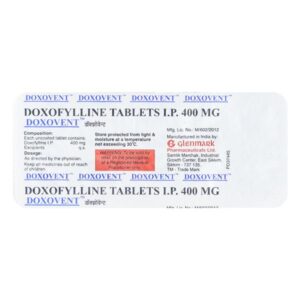DOXOPHYLINE
DOXOPHYLINE: Doxophylline is a bronchodilator drug used for the treatment of chronic obstructive pulmonary disease (COPD) and asthma. It is a xanthine derivative and works by relaxing the smooth muscles in the airways, opening them up and allowing for easier breathing.
The mechanism of action of doxophylline is similar to other xanthine bronchodilators, such as theophylline. It inhibits the enzyme phosphodiesterase, leading to increased levels of cyclic adenosine monophosphate (cAMP). Elevated cAMP levels cause bronchial smooth muscle relaxation, dilation of the airways, and reduction of inflammation in the respiratory tract.
The recommended dose of doxophylline varies depending on the individual’s age, weight, and the severity of the condition being treated. Generally, the starting dose for adults is 400 mg once daily, and it can be adjusted based on the response and tolerability. The drug can be taken with or without food.
Some common side effects of doxophylline may include gastrointestinal disturbances like nausea, vomiting, and abdominal pain. It may also cause headache, dizziness, palpitations, and sleep disturbances. In rare cases, it may lead to allergic reactions, such as skin rashes or itching. If any severe or persistent side effects occur, it is important to seek medical attention.
Doxophylline is generally well-tolerated, but it may interact with other drugs such as antibiotics, antifungals, heart medications, and certain psychiatric drugs. It is important to consult a healthcare professional or pharmacist to ensure there are no potential drug interactions or contraindications.
Overall, doxophylline is a bronchodilator that helps improve breathing in individuals with COPD and asthma. However, it is important to follow the prescribed dose and monitor for any potential side effects or adverse reactions.

